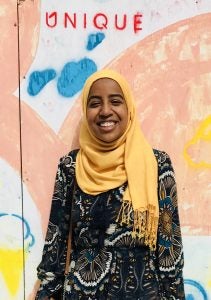Faith as a pathway to resilience
“What does it take to make a community more resilient?”
This question — asked at a panel I attended this past summer, Confronting the Global Forced Migration Crisis: Report Launch and hosted by the Center for Strategic and International Studies — has stayed with me long after my summer internship at the Jesuit Refugee Service/USA office.
There is no simple answer. The question of resilience is essentially about the capacity of humans to undergo hardship and build from it. In the context of global refugee communities, answers must include long-term and continuous engagement on behalf of governments, companies, and NGOs in order to provide the displaced with basic needs assistance, resettlement options, and employment pathways.
As I learned more about societal responses to the refugee crisis as a Policy and Advocacy Intern at JRS/USA, I began to ask, how I could engage on a more personal level and could my faith play a role as a foundation for resilience and a call to action.
As a Muslim, an immigrant, and someone who has grown up in religiously and culturally diverse communities, the refugee crisis and the search for better livelihoods deeply resonated with my own worldview. I felt a responsibility to educate myself on the complex ways that faith can motivate others to embrace difference and take action against injustice. At JRS this summer, I was able to see how faith and activism can be inextricably linked in the hearts of many.
Throughout my internship, I witnessed how building compassion through faith can work to reverse negative stereotypes about refugees and motivate policy changes. As one example, JRS/USA’s “Walk a Mile in My Shoes” refugee simulation asked community members from schools across the country, including Georgetown University, to learn about the struggles of refugees by experiencing the limits of available resources. At peer-led stations, students were asked to squeeze into a 37-square-foot tent together, carry heavy buckets of water, and eat meager portions of rice and beans for a meal. Although these simulations cannot be compared to the reality many refugees face, the exercise helped students imagine their experience, thus building empathy for refugees.
Furthermore, on World Refugee Day, I worked with JRS/USA to deliver a petition signed by 815 people from across the country. The petition called for an increase in the number of refugees admitted to the United States and robust humanitarian aid for Syrian refugees displaced by ongoing conflict. These activities and other advocacy campaigns serve as a starting point for acceptance and motivate participants to support refugees in their plight for safety and security in their religious communities and in the offices of policymakers.
It is clear that the goals and strategies of refugee advocacy are constantly shifting. As I continue my JRS internship into this semester, I reflect on my future in the campaign for the humanization, dignity, and support for global refugees and migrants. I am extremely grateful for the opportunities and knowledge that JRS/USA has granted me, and as long as I remember my initial motivation to get involved, my commitment to refugees and immigrants will continue to grow and evolve.
by Mena Mohamed, SFS’ 20
